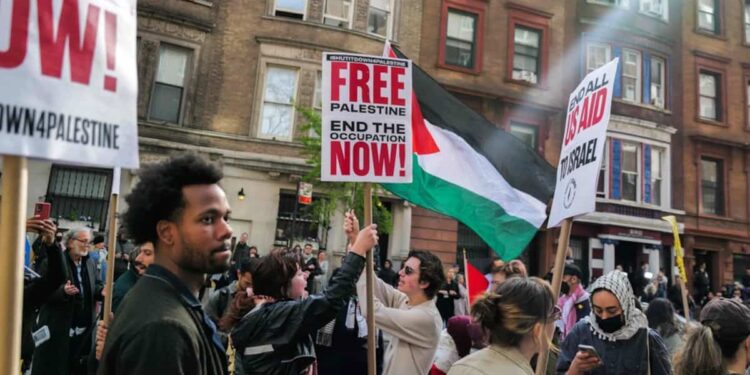For more than a week, Yazen has slept every night on a lawn at Columbia University. This 23-year-old Palestinian-American is one of dozens of students who set up a “Gaza solidarity camp” in the heart of New York, a source of tension on campus.
• Read also: Pro-Palestinian demonstrations: more than 130 people arrested in front of New York University
• Read also: Pro-Palestinian protests: Columbia University worried about student safety
• Read also: Around a hundred pro-Palestinian demonstrators arrested at Columbia University in New York
“Millions of Palestinians in Gaza sleep in the cold every night without access to food or shelter,” explains the student, who did not wish to give his last name.
“We have tents, they don’t have tents,” he says, admitting that he misses his bed and that lower back pain has appeared in recent days.
AFP
Since April 15, tents of all colors have appeared on the green, trimmed lawns of the campus of the prestigious New York university. Dozens of students and graduates joined the encampment to demand that the university leadership cut ties with companies with ties to Israel.
Universities have become a hotbed of debate in the United States since Hamas’ unprecedented October 7 attack on Israeli soil, which triggered a massive Israeli military operation that left more than 34,000 people dead in the Gaza Strip and caused a humanitarian catastrophe.
Other campuses have joined the movement, such as that of the prestigious Yale University, north of New York.
Yazen was one of the first to settle on the lawns of Columbia. From now on, he divides his days between maintaining the camp and studying medicine in an adjacent library.
While the number of demonstrators fluctuates greatly at different times of the day, there are sometimes several hundred.
“Show my solidarity”
Between speeches and concerts, demonstrators also organized Muslim prayers as well as meals to celebrate Jewish Passover, a celebration which began on Monday.
Despite pressure from the authorities to remove the demonstrators, Yazen is determined to stay.
“As a Palestinian, is it my responsibility to stand there and show solidarity with the people of Gaza? Absolutely,” insists the student.
Last week, tensions rose when management authorized the New York Police Department to visit campus and make arrests of protesters. She also suspended around 100 students.
In a perilous balancing act, management says it wants to both allow demonstrators to exercise their freedom of expression, while condemning the anti-Semitic comments and acts that some have reported.
AFP
Melissa Saidak, a Jewish Columbia student, said the protest drew dozens of more aggressive and often violent individuals to the campus gates.
“One person shouted at me, called me a ‘Zionist’ and a ‘murderer.’ They were banging on a pan or something,” says the student, who wears a medallion of solidarity with the Israeli hostages in Gaza around her neck as well as a Star of David.
“Making things worse”
“I was just trying to get home,” adds Melissa Saidak, saying the event caused her “a lot of physical pain.”
According to her, Columbia is not doing enough to protect its Jewish students: “the university continues to make things worse.”
The president of the university, Minouche Shafik, on Tuesday gave the demonstrators an ultimatum for midnight of the same day. An agreement had to be reached before this deadline to dismantle the encampment, otherwise the university would study “alternative options”.
AFP
Immediately after the announcement, hundreds of other students flocked to the protest site.
DP, a 22-year-old student at Columbia who only wanted to give her initials, is among those who decided to stay despite the administration’s ultimatum.
“It seems clear to me that it is necessary now,” said the student, who is part of the camp’s security service.
“I can’t bear the idea of not being in the camp,” she adds.
The deadline was finally extended by 48 hours and by Wednesday morning, the camp had returned to normal activity and a more peaceful atmosphere.
Without, at Columbia as on other American campuses, the tension having really subsided.



